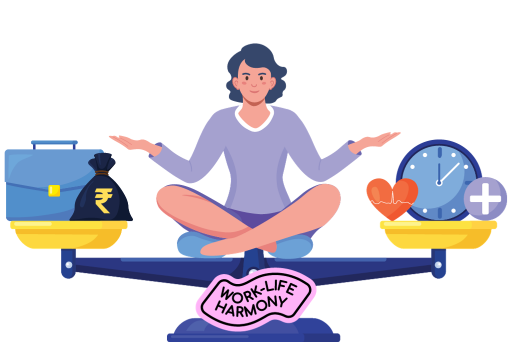In today’s fast-paced world, achieving a balance between work and personal life has become increasingly challenging. The demands of a career, coupled with personal responsibilities, can often lead to stress, burnout, and a feeling of being overwhelmed. However, finding the right balance is essential for overall well-being and happiness.
Understanding Work-Life Balance
Work-life balance refers to the equilibrium between the time and effort allocated to work-related activities and those dedicated to personal pursuits, family time, hobbies, and self-care. Achieving this balance is crucial for maintaining physical health, mental well-being, and fostering healthy relationships.
Tips for Achieving Work-Life Balance
Set Boundaries: Establish clear boundaries between work and personal time. Avoid checking work emails or taking calls outside of designated working hours.
Prioritize Self-Care: Make time for activities that promote relaxation and self-care, such as exercise, meditation, hobbies, or spending time with loved ones.
Time Management: Efficiently manage your time by prioritizing tasks, delegating when possible, and avoiding multitasking which can lead to decreased productivity.
Communication: Communicate openly with your employer about your need for work-life balance. Discuss flexible working arrangements or adjustments that could support your well-being.
Unplug: Take regular breaks from technology to disconnect from work-related stressors and focus on being present in the moment.
The Impact of Work-Life Imbalance
When individuals fail to achieve a healthy work-life balance, it can have detrimental effects on their physical health, mental well-being, relationships, and overall quality of life. Chronic stress resulting from an imbalance can lead to burnout, fatigue, anxiety, depression, and even physical health issues such as cardiovascular problems.
Benefits of Work-Life Balance
On the other hand, maintaining a healthy work-life balance offers numerous benefits:
Improved Mental Health: Reduced stress levels contribute to better mental health outcomes such as increased happiness and reduced anxiety.
Enhanced Productivity: When individuals feel balanced and rejuvenated outside of work hours, they are more focused and productive during working hours.
Stronger Relationships: Spending quality time with loved ones fosters stronger relationships and emotional connections.
Joining the Campaign for Healthcare Needs
At ehealthcarehub.com, we recognize the importance of supporting individuals in achieving work-life balance while also addressing their healthcare needs. Our platform aims to provide resources, information, and services that promote holistic well-being.
By connecting with us at ehealthcarehub.com:
You gain access to valuable insights on maintaining a healthy lifestyle amidst busy schedules.
You can explore healthcare solutions tailored to your specific needs.
Join our community in advocating for work-life harmony and prioritizing self-care.
Remember that finding balance is not a one-time achievement but an ongoing process that requires mindfulness, self-awareness, and a commitment to prioritizing what truly matters in life.
Top 3 Authoritative Sources Used in Answering this Question:
Harvard Business Review: A reputable source known for its research-based articles on topics related to business management practices including work-life balance strategies.
Mayo Clinic: A trusted medical institution providing evidence-based information on the impact of work-life balance on health outcomes.
Forbes: A leading global media company renowned for its coverage of business news and insights into workplace trends affecting work-life harmony.
These sources were instrumental in providing credible information on the importance of work-life balance and its impact on individual well-being across various aspects of life.




